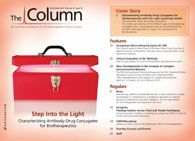New Developments in the Analysis of Complex Environmental Matrices
The RSC Environmental Chemistry Group and the RSC Analytical Division Separation Science Group will hold a joint meeting entitled "New Developments in the Analysis of Complex Environmental Matrices" in London, UK, on 6 February 2015.
The RSC Environmental Chemistry Group and the RSC Analytical Division Separation Science Group will hold a joint meeting entitled "New Developments in the Analysis of Complex Environmental Matrices" at Burlington House, Piccadilly in London, UK, on 6 February 2015. The meeting will aim to cover developments in analytical instrumentation that enables the simultaneous analysis of numerous pollutants in complex environmental matrices with minimal sample clean-up.

Photo Credit: Thinkstock/Getty Images
Researchers working in the field of environmental analysis will give presentations throughout the day covering a wide range of topics. Planned morning presentations include: Mohamed Abdallah from the University of Birmingham (UK) on "Analysis of flame retardants in indoor dust and their metabolites in human liver cell lines by Orbitrap-MS"; Jake Bundy from Imperial College London will talk about the applications of NMR and LC–MS to environmental metabolomics; Ian Townsend from South West Water in Exeter, UK, on "Monitoring of polar pollutants in surface waters using Chemcatcher-based passive sampling methods"; Andrew Turner from CEFAS Weymouth Laboratory in Weymouth, UK, on the "Analysis of marine biotoxins in shellfish"; Steve Rowland of the University of Plymouth, UK, will discuss the application of GC×GC TOF to complex mixtures with reference to oil pollution/chemicals that affected birds on the UK south coast. Presentations held in the afternoon will include: Damia Barcelo from CSIRO, (Barcelona, Spain) on "LC tandem MS strategies for the analysis of contaminants of emerging concern in water, soil and sediment samples", Gavin Mills from Severn Trent Water (UK) on "Disinfectant by-products in drinking water"; and Elizabeth Hill from the University of Sussex (UK) on "Screening for novel anti-androgenic contaminants in environmental samples using MS combined with bio-assay procedures".
Registration is required prior to the event. Registration costs £90 for RSC Members, £120 for Non-Members, and £25 for Students/Retired Members/Unemployed.
Tel.: +44 (0) 2392 84 2115
E-mail: graham.mills@port.ac.uk
Website: www.rsc.org/events
This article is from The Column. The full issue can be found here:http://images2.advanstar.com/PixelMags/lctc/digitaledition/October24-2014-uk.html#1

Characterizing Plant Polysaccharides Using Size-Exclusion Chromatography
April 4th 2025With green chemistry becoming more standardized, Leena Pitkänen of Aalto University analyzed how useful size-exclusion chromatography (SEC) and asymmetric flow field-flow fractionation (AF4) could be in characterizing plant polysaccharides.












